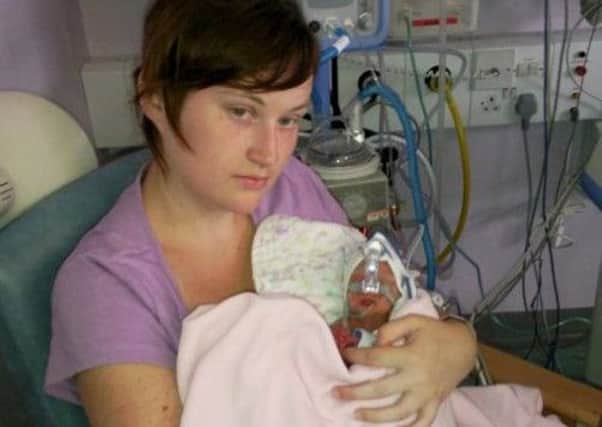Mother denies killing premature baby son after struggling to cope


Leighton O’Donnell weighed only one pound 15 ounces when he was born 13 weeks premature to his mother Gemma in hospital in Manchester, because there were insufficient special care baby beds then available in Yorkshire.
He died 20 weeks later on December 4, 2010, from a brain injury, having suffered a number of medical problems in between associated with his premature birth.
Advertisement
Hide AdAdvertisement
Hide AdJames Hill QC, prosecuting, said it was the Crown’s case that fatal brain injury was caused by non-accidental trauma most likely due to his being shaken “and it is our case the only person who could be responsible was his mother”.
“The prosecution is not suggesting that the defendant intended to kill her son, we are not suggesting she even intended him serious harm; if that had been the case the appropriate charge would be murder.
“In this case we suggest that in a moment of temporary loss of control born out of frustration Gemma O’Donnell shook Leighton.
“We say that she shook him and that amounts to an assault and we say that any reasonable person would realise if you shake a baby, a 20-week-old baby, then you are exposing that baby to risk of injury, a risk of harm; tragically in this case the harm was fatal.”
Advertisement
Hide AdAdvertisement
Hide AdO’Donnell, 27, of Bright Street, York, denies the manslaughter of her son and her counsel, Robert Smith QC, told the jury the defence would raise other explanations for his collapse and death. Mr Hill said the child’s natural father did not feature because he and O’Donnell had separated before Leighton’s birth.
The baby had a range of medical problems associated with his prematurity including a chronic lung condition, bleeding within his eyes and a small hole in his heart but made slow and steady progress in hospital.
Aged 13 days, he was transferred to the special care baby unit at York District Hospital where he stayed for nearly three months until O’Donnell was allowed to take him home, by now weighing 5lb 8oz.
He still needed help with his breathing via a nasal tube and oxygen cylinders which she took home with him, along with a monitor to warn if he stopped or struggled breathing.
Advertisement
Hide AdAdvertisement
Hide AdHowever, he did not thrive at home and a neo-natal outreach nurse noticed he was not gaining weight but gave his mother some leeway because the baby was treated in hospital for a cold on November 17.
But two days later when she found Leighton had lost nine ounces she took him back into hospital where he stayed for four days while she made sure his mother was feeding him every three hours.
Still concerned in following days, she spoke to a doctor but it was decided to leave it because Leighton was due in on November 29 for a hernia operation.
Mr Hill suggested the fact the baby thrived in hospital but not at home was an indicator O’Donnell was not coping. In the days before his collapse she showed further signs of cracking under strain, ringing a friend of her deceased mother saying: “I can’t shut him up; he won’t stop crying.”
Advertisement
Hide AdAdvertisement
Hide AdOn the morning of November 29 after trying to ring the nurse, she called the hospital to say the baby was lethargic and gasping for breath and was told to ring for an ambulance.
Travelling with him to York Hospital, O’Donnell said in the ambulance she was worried she had “done something wrong”.
Leighton’s condition deteriorated and he was transferred to Leeds General Infirmary where he died, a scan having shown swelling of the brain.
Mr Smith told the jury the defence would argue Leighton should not be viewed as a normal child of that age because of his premature background and urged them to be cautious about the claim his head condition could only be due to being shaken.
“We will be submitting that children that fall into this group have a significantly greater risk of developing fatal illness.”
The trial continues.